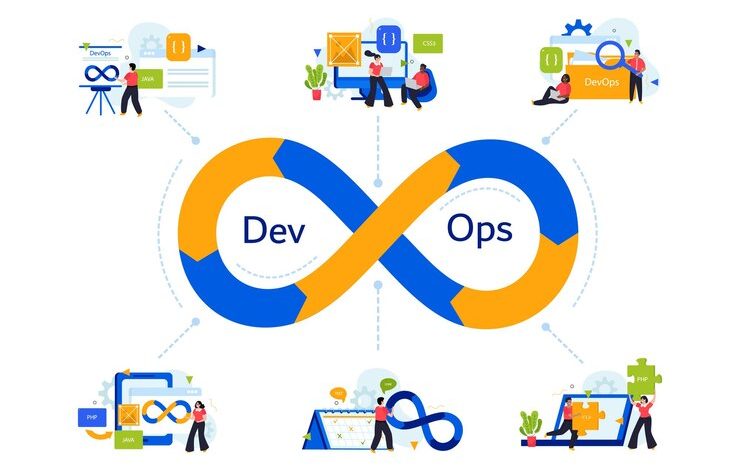
DevOps Engineer in Modern Software Development
DevOps Engineer, a set of practices that emphasize collaboration and communication between development and operations teams, aims to streamline the software development lifecycle. At the heart of this collaboration is the DevOps engineer, a role that plays a pivotal role in orchestrating the tools, processes, and culture that enable continuous integration, delivery, and deployment. This exploration will delve into who a DevOps engineer is, the critical role they play in modern software development, and the steps to become one, read more about how to become DevOps Engineer with AWS azure web services.
Who is a DevOps Engineer?

A DevOps engineer is a professional who bridges the gap between software development and IT operations, ensuring a seamless and collaborative workflow throughout the software development lifecycle. DevOps engineers leverage automation, tools, and cultural practices to enhance communication, speed up development processes, and deliver high-quality software. They work to eliminate silos between development and operations teams, fostering a culture of collaboration and shared responsibility and also study cloud solution by hitting on this link Cloud solution.
Key Responsibilities of a DevOps Engineer:
- Automation: DevOps engineers focus on automating repetitive tasks in the software development lifecycle. This includes automating the build, test, and deployment processes to accelerate delivery and reduce manual errors.
- Collaboration: DevOps emphasizes collaboration and communication. DevOps engineers work closely with development, testing, and operations teams to ensure a shared understanding of project goals, timelines, and requirements.
- Continuous Integration and Deployment (CI/CD): DevOps engineers implement CI/CD pipelines, which automate the process of integrating code changes, testing them, and deploying them to production. This results in faster and more reliable software releases.
- Infrastructure as Code (IaC): DevOps engineers use IaC to manage and provision infrastructure using code. This allows for consistent and repeatable infrastructure deployments, reducing the risk of configuration drift and ensuring scalability.
- Monitoring and Logging: DevOps engineers implement monitoring and logging solutions to gain insights into the performance and health of applications and infrastructure. Proactive monitoring helps identify issues before they impact users.
- Security: Security is a critical aspect of DevOps. DevOps engineers integrate security practices into the development and deployment pipelines, ensuring that security is considered throughout the software development lifecycle.
- Cloud Services: With the prevalence of cloud computing, DevOps engineers often work with cloud platforms such as AWS, Azure, or Google Cloud to leverage scalable and flexible infrastructure.
How to Get a Job as a DevOps Engineer:
Becoming a DevOps engineer involves a combination of education, practical experience, and a commitment to continuous learning. Here are steps to help you get a job as a DevOps engineer:
- Educational Background
- While there is no specific degree requirement for DevOps roles, a background in computer science, information technology, or a related field is beneficial.
- Pursue relevant certifications such as AWS Certified DevOps Engineer, Microsoft Certified: Azure DevOps Engineer Expert, or Docker Certified Associate.
- Gain Technical Skills
- Develop proficiency in scripting languages such as Python, Ruby, or Shell scripting.
- Learn configuration management tools like Ansible, Puppet, or Chef.
- Familiarize yourself with containerization technologies like Docker and container orchestration tools like Kubernetes.
- Hands-On Experience
- Gain hands-on experience by working on real-world projects. Contribute to open-source projects or build your own projects to showcase your skills.
- Set up and manage CI/CD pipelines, automate deployment processes, and work with version control systems like Git.
- Cloud Platform Knowledge
- Acquire knowledge of cloud platforms such as AWS, Azure, or Google Cloud. Understand how to provision, manage, and scale infrastructure in the cloud.
- Networking and Community Engagement
- Join DevOps communities, attend meetups, and participate in online forums to connect with other professionals in the field.
- Networking can provide valuable insights, job opportunities, and a supportive community for learning.
- Certifications
- Obtain relevant certifications to validate your skills. Certifications from cloud service providers and DevOps tool vendors can enhance your credibility.
- Soft Skills
- Develop strong communication and collaboration skills. DevOps is not just about tools; it’s about fostering a culture of collaboration and shared responsibility.
- Build a Portfolio
- Create a portfolio showcasing your projects, contributions to open source, and any certifications you’ve earned.
- A well-documented portfolio demonstrates your practical skills and commitment to the field.
Requirements to be a DevOps Engineer:
- Technical Skills
- Proficiency in scripting languages (e.g., Python, Ruby, Shell).
- Experience with configuration management tools (e.g., Ansible, Puppet, Chef).
- Knowledge of containerization technologies (e.g., Docker) and container orchestration (e.g., Kubernetes).
- Familiarity with CI/CD tools (e.g., Jenkins, GitLab CI).
- Understanding of version control systems, especially Git.
- Cloud Skills
- Knowledge of cloud platforms (e.g., AWS, Azure, Google Cloud).
- Experience with infrastructure as code (e.g., Terraform).
- Automation Skills
- Ability to automate repetitive tasks and workflows.
- Experience with automation tools and frameworks.
- Collaboration and Communication
- Strong collaboration skills to work effectively with cross-functional teams.
- Clear communication to convey technical concepts to both technical and non-technical stakeholders.
- Security Awareness
- Understanding of security practices in the context of DevOps.
- Knowledge of security tools and best practices for securing infrastructure and applications.
- Problem-Solving and Troubleshooting
- Strong problem-solving skills to troubleshoot issues in complex distributed systems.
- Ability to analyze logs, metrics, and other data to identify and resolve issues.
- Continuous Learning
- DevOps is a rapidly evolving field. A commitment to continuous learning is crucial to stay updated on new tools, technologies, and best practices.
A DevOps Engineer plays a critical role in modern software development and IT operations, focusing on streamlining the development lifecycle, improving collaboration between development and operations teams, and automating processes to enhance efficiency, quality, and reliability of software delivery. Here’s an overview of the responsibilities, skills, and contributions of a DevOps Engineer:
- Collaboration and Communication:
- Facilitate communication and collaboration between development, operations, and other stakeholders to ensure alignment of goals and priorities.
- Act as a bridge between development and operations teams, promoting a culture of shared responsibility and accountability.
- Infrastructure as Code (IaC):
- Implement and maintain infrastructure as code practices using tools like Terraform, Ansible, or Azure Resource Manager (ARM) templates to automate the provisioning and configuration of infrastructure components.
- Manage cloud infrastructure environments (such as Azure, AWS, or Google Cloud Platform) efficiently and securely.
- Continuous Integration and Continuous Deployment (CI/CD):
- Design, implement, and maintain CI/CD pipelines using tools like Jenkins, Azure DevOps, or GitLab CI/CD to automate the build, test, and deployment processes.
- Enable automated testing, code quality checks, and deployment strategies such as blue-green deployments or canary releases to ensure rapid and reliable software delivery.
- Monitoring and Logging:
- Set up and configure monitoring and logging solutions (e.g., Prometheus, Grafana, ELK stack, Azure Monitor) to track the performance, availability, and health of applications and infrastructure.
- Implement alerting mechanisms and incident response processes to proactively identify and address issues before they impact users.
- Security and Compliance:
- Collaborate with security teams to integrate security practices into the development and deployment pipelines, such as vulnerability scanning, code analysis, and compliance checks.
- Implement security best practices, such as least privilege access, encryption, and network segmentation, to protect sensitive data and infrastructure resources.
- Containerization and Orchestration:
- Containerize applications using Docker and manage container orchestration platforms like Kubernetes or Docker Swarm to enable scalable, resilient, and portable deployments.
- Optimize container workflows and resource utilization to maximize efficiency and minimize costs.
- Automation and Scripting:
- Write scripts and automation workflows using languages like Python, Bash, or PowerShell to automate repetitive tasks, configuration management, and deployment processes.
- Leverage infrastructure automation tools and frameworks (e.g., Chef, Puppet, Ansible) to ensure consistency and repeatability in infrastructure configurations.
- Continuous Improvement:
- Continuously evaluate and improve the DevOps toolchain, processes, and practices to enhance productivity, reliability, and innovation.
- Foster a culture of learning and experimentation, encouraging team members to adopt new technologies and best practices.
Discover more from Infotech
Subscribe to get the latest posts sent to your email.










